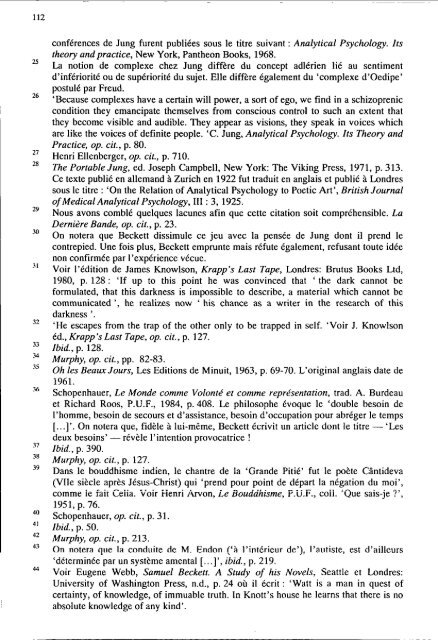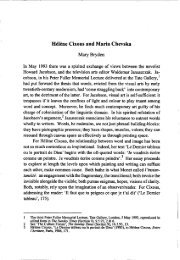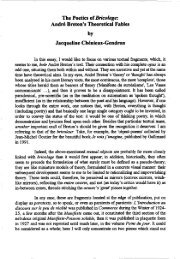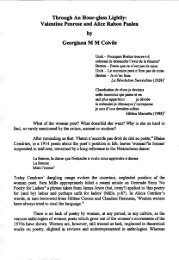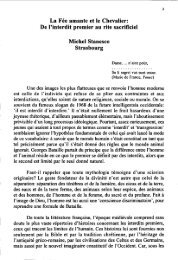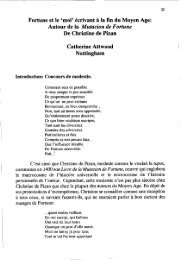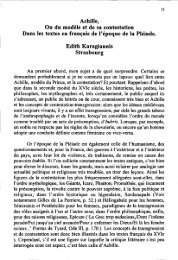De la problématique du moi A la fiction du moi Chez Beckett ...
De la problématique du moi A la fiction du moi Chez Beckett ...
De la problématique du moi A la fiction du moi Chez Beckett ...
Create successful ePaper yourself
Turn your PDF publications into a flip-book with our unique Google optimized e-Paper software.
~<br />
112<br />
2s<br />
26<br />
27<br />
28<br />
29<br />
30<br />
31<br />
32<br />
33<br />
34<br />
35<br />
36<br />
37<br />
38<br />
39<br />
40<br />
41<br />
42<br />
43<br />
44<br />
conférences de Jung furent publiées sous le titre suivant : Analytical Psychology. Its<br />
theory andpractice, New York, Pantheon Books, 1968.<br />
La notion de complexe chez Jung diffère <strong>du</strong> concept adlérien lié au sentiment<br />
d’infériorité ou de supériorité <strong>du</strong> sujet. Elle diffère également <strong>du</strong> ‘complexe d’oedipe’<br />
postulé par Freud.<br />
‘Because complexes have a certain will power, a sort of ego, we find in a schizoprenic<br />
condition they emancipate themselves from conscious control to such an extent that<br />
they become visible and audible. They appear as visions, they speak in voices which<br />
are like the voices of definite people. ‘C. Jung, Analytical Psychology. Its Theory and<br />
Practice, op. cit., p. 80.<br />
Henri Ellenberger, op. cit., p. 710.<br />
The Portable Jung, ed. Joseph Campbell, New York: The Viking Press, 1971, p. 313.<br />
Ce texte publié en allemand à Zurich en 1922 fut tra<strong>du</strong>it en ang<strong>la</strong>is et publié à Londres<br />
sous le titre : ‘On the Re<strong>la</strong>tion of Analytical Psychology to Poetic Art’, British Journal<br />
of Medical Analytical Psychology, III : 3, 1925.<br />
Nous avons comblé quelques <strong>la</strong>cunes afin que cette citation soit compréhensible. La<br />
<strong>De</strong>rnière Bande, op. cit., p. 23.<br />
On notera que <strong>Beckett</strong> dissimule ce jeu avec <strong>la</strong> pensée de Jung dont il prend le<br />
contrepied. Une fois plus, <strong>Beckett</strong> emprunte mais réfute également, refusant toute idée<br />
non confirmée par l’expérience vécue.<br />
Voir l’édition de James Knowlson, Krapp’s Last Tape, Londres: Brutus Books Ltd,<br />
1980, p. 128 : ‘If up to this point he was convinced that ‘ the dark cannot be<br />
formu<strong>la</strong>ted, that this darkness is impossible to describe, a material which cannot be<br />
communicated ’, he realizes now ‘ his chance as a writer in the research of this<br />
darkness ’.<br />
‘He escapes from the trap of the other only to be trapped in self. ‘Voir J. Knowlson<br />
éd., Krapp’s Last Tape, op. cit., p. 127.<br />
Ibid., p. 128.<br />
Murphy, op. cit., pp. 82-83.<br />
Oh les Beaux Jours, Les Editions de Minuit, 1963, p. 69-70. L’original ang<strong>la</strong>is date de<br />
1961.<br />
Schopenhauer, Le Monde comme Volonté et comme représentation, trad. A. Burdeau<br />
et Richard Roos, P.U.F., 1984, p. 408. Le philosophe évoque le ‘double besoin de<br />
l’homme, besoin de secours et d’assistance, besoin d’occupation pour abréger le temps<br />
[...I’. On notera que, fidèle à lui-même, <strong>Beckett</strong> écrivit un article dont le titre - ‘Les<br />
deux besoins’ - révèle l’intention provocatrice !<br />
Ibid., p. 390.<br />
Murphy, op. cit., p. 127.<br />
Dans le bouddhisme indien, le chantre de <strong>la</strong> ‘Grande Pitié’ fut le poète Cântideva<br />
(VIIe siècle après Jésus-Christ) qui ‘prend pour point de départ <strong>la</strong> négation <strong>du</strong> <strong>moi</strong>’,<br />
comme ie Îair Zeiia. Voir Henri h on, Le ilou<strong>du</strong>hisrne, F.Ü.F., coii. ‘Que sais-je ?;,<br />
1951, p. 76.<br />
Schopenhauer, op. cit., p. 31.<br />
Ibid., p. 50.<br />
Murphy, op. cit., p. 213.<br />
On notera que <strong>la</strong> con<strong>du</strong>ite de M. Endon (‘à l’intérieur de’), l’autiste, est d’ailleurs<br />
‘déterminée par un système amental [...I’, ibid., p. 219.<br />
Voir Eugene Webb, Samuel <strong>Beckett</strong>. A Study of his Novels, Seattle et Londres:<br />
University of Washington Press, n.d., p. 24 OU il écrit : ‘Watt is a man in quest of<br />
certainty, of knowledge, of immuable truth. In Knott’s house he learns that there is no<br />
absolute knowledge of any kind’.


